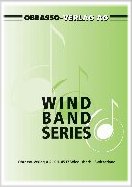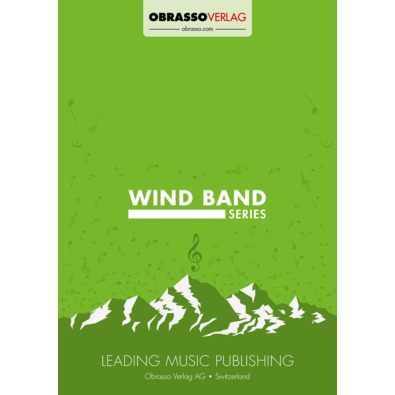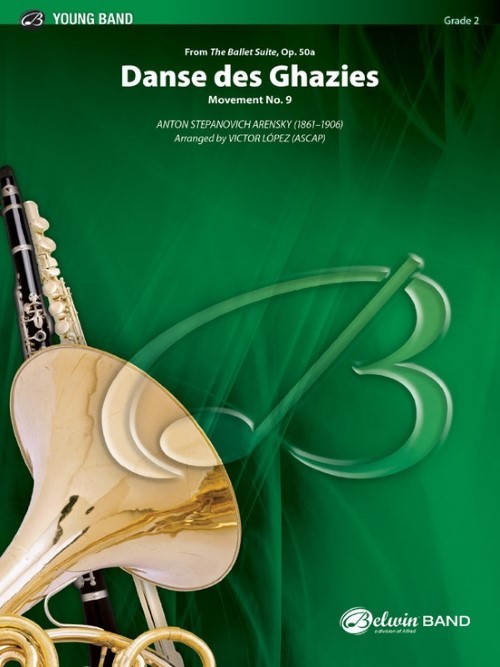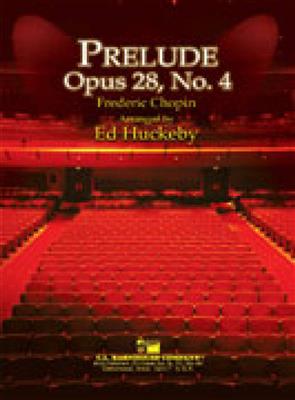Results
-
 £85.70
£85.70 -
 £85.70
£85.70 -
£74.99
-
 £116.60
£116.60Bekken (Fra Lyriske stykker opus 62) - Edvard Grieg
Brooklet is one of the movements from Grieg's Lyric Pieces for Solo Piano opus 62. Information for the conductor: Brooklet is an technically advanced work for solo piano. In this arrangement, technical passages are simplified by overlapping and doubling some of the parts. To master the technical challenges and make it sound effortless, it is important to pay close attention to balance and precision. Some of the parts also have alternative parts added which can lower the technical challenges a bit. The normal instrumentation are Clarinet 1-2-3, but there is also an "optional" part for Solo Clarinet. This is included on the same sheet as Clarinet 1. Both parts can stand alone or be played together. (i.e. The Solo Clarinet part can be played in addition to Clarinet 1, in whole or in part if desired, or it can replace Clarinet 1 entirely, using only Solo Clarinet and Clarinet 2 and 3.). From bar 5 to bar 13, there is a suggested solo for Solo Clarinet. If played by Solo Clarinet, please omit Clarinet 1, 2 & 3 for these bars.
Estimated delivery 7-14 working days
-
 £274.99
£274.99Symphony No. 2: States Of Mind, Opus 87 - Teo Aparicio-Barberán
I- Logos (reason)II- Pathos (emotion)III- Ethos (credibility)The ancient Greeks believed that music shaped the character of man. In Egyptian temples, music was an essential part of the magical rites to alter the course of nature or to treat illness.And today we know that sound can actually alter matter. The secret of music lies in harmony and mathematics, as many great musicians and experts have always known.One of the most important qualities of music is that it enables the listener to focushis attention inwards instead of on what is around him. It is indisputable that music can inspire emotion. Music leads us into a universe of emotions that are difficult to put into words. In short, music reaches into corners of our soul and thoughtsthat words cannot reach and makes it possible to more clearly describe these different States of mind.The composer of this symphony also believes that each "musical argument" must be constructed so that it will induce the desired reaction in thelistener.Music: more than wordsIn recent times, most orchestral symphonies have been based on a story, a text or something similar so that their composition must be structured accordingly.The intention of this work by Teo Aparicio-Barbern is quitedifferent. The composer describes the three elements of the argument as the only formal structure of the work. Since certain philosophers in world history were able to subdivide grammatical argument, why shouldnt that also be possible for the musicalargument?Since ancient times the power of the spoken word has captivated mankind. How can an argument move people and mobilise the masses? Where does the power of words come from today? The answer lays not so much in what people say but in how theysay it.Rhetoric is one of the oldest humanist disciplines in Western civilisation. Aristotle, in the 4th century BC, called it the art of persuasion. Indeed, the terms rhetoric and persuasion are mutually interchangeable.More than 2000 years agoAristotle structured his rhetoric according to the following three elements: the logos, the pathos and the ethos.Logos (words, reason) is the reasoning that gives freedom to the structure of the text by expressing what one wishes to say usingspecialist terms. With logos we create arguments to receive public approval and to defend our ideas.Pathos, the second element, refers to the effective use of public psychology. Pathos can be considered as the capacity to induce the desired emotionalresponse in the public, by creating an emotional connection with the public so that they accept our message.The third element, ethos (credibility), refers to the character of the speaker and is perhaps the most important of the three elements.Aristotle based his concept of ethos upon his belief that truth and justice will always have the upper hand over anger. He believed that what was true and good was easier to prove and was more persuasive.This second orchestral symphony from thecomposer from Enguera follows these three parameters of the argument according to Aristotle. Each movement tries to summon a different state of mind in the listener so that the message itself can be better understood and appreciated. Apart from thesethree general concepts the music is only structured, as Claude Debussy would say, in a "formative way".The first movement, logos, is based on a scherzo melody that undergoes various changes in rhythm and harmony. The arguments are presented by meansof conventional techniques of composition. The second movement, pathos, is characterised by suggestions of sound. It is subdivided into two large parts. The first part is based on a five seven sequence with five sounds that are repeated in differentenvironments, structures and dynamics. The second part, which is largely tonal, brings out more directly the emotional overtones that each argument must have. The third movement, ethos, is a faithful rendition of the composers personality. In thislast part, clear rhythmic sequences stand out, there are large dynamic contrasts and lots of tone variation. In addition, and this is quite in keeping with the composers earlier work, the harmony in States of Mind is handled in a manner that is bothoriginal and efficient, as a result of which Aparicio-Barberns message is well understood by the listener.This second symphony by Teo Aparicio-Barbern is devoted to "my dear Henrie Adams, a guiding light in this eternally dark musical world. Thankyou for everything."
Estimated delivery 7-14 working days
-
 £53.95
£53.95Danse des Ghazies (from The Ballet Suite, Opus 50a) (Concert Band - Score and Parts) - Arensky, Anton - Lopez, Victor
Originally written for piano, this work translates well for young bands. Written in 3/4, but intended to be performed in a bouncy one, its light texture, melodic contour, and playful nature will be an outstanding addition to any contest or festival program.Duration: 3:00
Estimated delivery 7-14 working days
-
 £64.35
£64.35Prelude, Opus 28, No. 4 - Chopin, Frederic
One of Frederic Chopin's best known works, Prelude, Op. 28, No. 4, presents emotion-packed performance opportunities for bands at all levels. This new Ed Huckeby transcription for band provides an almost literal translation of Chopin's original work with tremendous musical challenges in both the interpretive and dynamic realms, providing the ensemble an opportunity to explore musical possibilities which might be less attainable in a more technical piece. The recognizable melodic and harmonic structures will make this piece a real "hit" with concert audiences and provides an opportunity to teach the musical styles of the greatest 19th century composer of piano music. Great music!
Estimated delivery 7-14 working days
-
 £66.00
£66.00Prelude, Opus 28, No. 4 - Frédéric Chopin
One of Frederic Chopin's best known works, Prelude, Op. 28, No. 4, presents emotion-packed performance opportunities for bands at all levels. This new Ed Huckeby transcription for band provides an almost literal translation of Chopin's original work with tremendous musical challenges in both the interpretive and dynamic realms, providing the ensemble an opportunity to explore musical possibilities which might be less attainable in a more technical piece. The recognizable melodic and harmonic structures will make this piece a real "hit" with concert audiences and provides an opportunity to teach the musical styles of the greatest 19th century composer of piano music. Greatmusic!
Estimated delivery 7-14 working days
-
 £6.25
£6.25Romance, Opus 40 - By Ludwig van Beethoven / arr. Todd Stalter
Beethoven wrote two "Romances" for violin and orchestra; his second one, the Op. 40 in G Major, was actually published in 1802, two years before the Op. 50 in F Major, even though the F Major "Romance" was composed four years earlier. The double stops of the violin solo are faithfully preserved in this arrangement, and careful attention to articulation and emphasis on melodic playing by every section of the band will make this piece an ideal choice to introduce the music of this master composer to young musicians.
Estimated delivery 3-5 days
-
 £6.25
£6.25March, Opus 108 - By Felix Mendelssohn / arr. Todd Stalter
Mendelssohn wrote his "March," op. 108, in 1841 for a festival celebrating the famous painter Peter Von Cornelius' visit to Dresden. It is a stately and festive sounding work, and a rarely performed gem by one of the world's great composers. Careful observance of articulations and dynamics will make this march spring to life. This title is available in SmartMusic.
Estimated delivery 3-5 days
